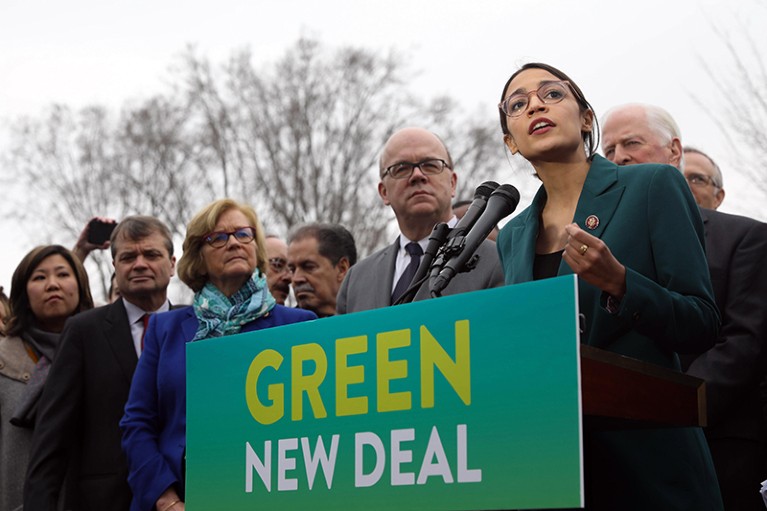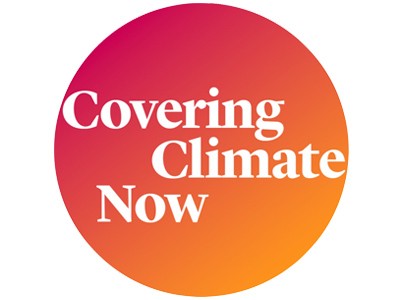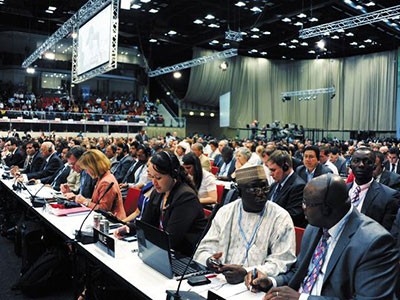
Alexandria Ocasio-Cortez, Democratic representative for New York, announces the Green New Deal package of legislation in February 2019.Credit: Planetpix/Alamy
On Fire: The Burning Case for a Green New Deal Naomi Klein Simon & Schuster (2019)
I don’t always recommend a book I disagree with. But when I do, it’s usually by Naomi Klein.
In truth, my views chime with much in the Canadian journalist’s collection of articles and essays, On Fire. But I have substantial points of disagreement.
Why Nature joined the Covering Climate Now initiative
Klein has been a leading voice at the intersection of social and environmental movements for two decades — ever since she inspired a generation to reflect on the blight of consumerism with No Logo (1999). And she does not disappoint here. She provides a lucid and compelling case for the Green New Deal (GND). This set of proposed federal policies, advocated by Democratic representative for New York Alexandria Ocasio-Cortez, aims to mobilize massive societal resources to prevent a dangerous rise in Earth’s temperature of more than 1.5 °C above pre-industrial levels. (Economic theorist Jeremy Rifkin’s The Green New Deal, out this month, makes a good read in tandem.)
To tackle the climate crisis, both urgency and agency must be communicated to the public. On Fire does both. Klein emphasizes how fossil-fuel interests have poisoned the political waters of climate action for decades, in the United States and elsewhere. Progress will probably demand laws that force special-interest money — including that from the fossil-fuel industry and undisclosed, untraceable ‘dark money’ — out of our politics. It will also probably involve promoting fossil-fuel divestment by public and private institutions; conducting campaigns to pressure media outlets to refuse fossil-fuel advertising money; and removing the social licence currently given to polluters, by publicly calling out their behaviour. These things, in turn, aim to create a risky financial atmosphere for fossil-fuel companies, encouraging them to leave their primary assets in the ground, and investors to put their money elsewhere.
Deep change is necessary. Klein emphasizes that it will centre on expressions of collective action, such as the global youth climate movement, and the anti-oil-pipeline protests in North Dakota in 2016–17. But Klein goes further. Her thesis is that neoliberalism — the prevailing global policy model, predicated on privatization and free-market capitalism — must be overthrown through mass resistance. She holds that climate change can’t be separated from other pressing social problems, each a symptom of neoliberalism: income inequality, corporate surveillance, misogyny and white supremacy.
I share her concern over each of these societal afflictions, but I wonder at the assertion that it’s not possible to address climate change without solving all that plagues us. My worry is this. Saddling a climate movement with a laundry list of other worthy social programmes risks alienating needed supporters (say, independents and moderate conservatives) who are apprehensive about a broader agenda of progressive social change.
The pessimist in me also doubts that we’ll eliminate greed and intolerance within the next decade. As Klein rightly notes, this is precisely the timescale over which we must make substantial progress in decarbonizing our economy to avert catastrophic climate change. The optimist in me, meanwhile, recalls the response to past global environmental threats, such as depletion of the ozone layer that protects us from ultraviolet radiation. Action to reduce ozone-damaging chlorofluorocarbons under the 1987 Montreal Protocol averted environmental catastrophe. Alas, it did not obviously solve any social problems in the process.
So do we work within the system, or overthrow it? There is another way: to recognize this dilemma as false. We can, after all, work within the system (organizing, voting, demonstrating and using all the levers of democracy) while seeking to change it (for example by routing corporate money out of politics through regulations and governmental reform). I have not yet given up on this dual escape route from climate chaos.
I am also not completely convinced by the GND in its current form. I broadly support its goals, but I question its rejection of market mechanisms for pricing carbon. Klein critiques such measures as both inadequate for reducing carbon emissions and inconsistent with a just energy transition; her argument is that the wealthy, who expend the most carbon, will not be deterred by having to pay for it.
Climate economics: Corporate greening falls short
Such a rejection of one of the most potent tools for reducing carbon emissions is misguided, in my view. Achieving the needed emissions cuts depends on the price. As long as that matches an objectively determined social cost of carbon pollution, it should produce the needed result. And whether a carbon tax is progressive or regressive depends on precisely what is done with the revenue. A dividend, for example, could be paid preferentially to those most affected by climate change — particularly people with low incomes.
It’s advisable to decouple economic justice and environmental issues, given the turbulence in US politics under President Donald Trump. Otherwise, as one individual said to me, the Republican Party can easily cry ‘socialism’ to convince voters to oppose the kinds of policy we need to mitigate climate change.
Klein sometimes overreaches in building the case for climate concern. For example, she states that “oceans are warming 40 percent faster than the United Nations predicted just five years ago”. However, the article on which this claim is based isn’t original research, but a commentary (L. Cheng et al. Science 363, 128–129; 2019). It notes that when errors in historical data that had led to a mismatch with climate-model predictions are corrected, the model predictions and observations are in very good agreement.
And Klein ties the current refugee crisis around the world more closely to climate change than can be objectively justified, in my view. Although climate change is an increasingly important driver of migration, myriad other factors are at work. These include conflict, economic disparity and oppressive political regimes. When it comes to making the case for climate action, the truth is bad enough. We don’t need to stretch it.
These are minor quibbles, however. In On Fire, Klein once again provides a provocative and evocative manifesto deserving of our attention. I urge anyone who cares about the defining threat of our time to read it, and talk about it.




 Climate stalemate
Climate stalemate
 Denialism deciphered
Denialism deciphered
 At the storm front
At the storm front
 Climate economics: Corporate greening falls short
Climate economics: Corporate greening falls short





